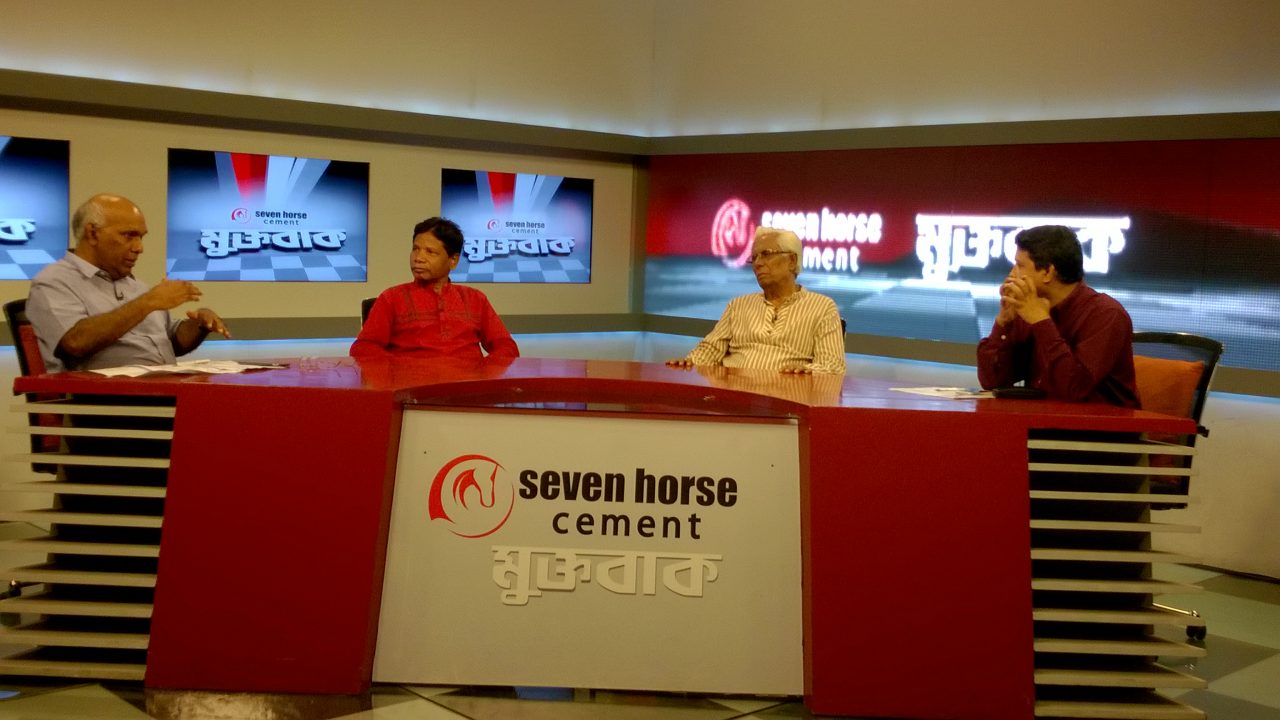TV talk show has created high sensitization among IPs and mainstream community

Indigenous peoples of plain land are gradually losing their grounds leaps and bounds. Abject poverty, high illiteracy, exist very few of political organizations among them and less state protection and positive discrimination in favor of them, lead their lives in despair and uncertainty. Most of the Adivasis depend on agriculture as a means of their livelihood. However, once Bangladesh regarded as a country of agriculture, now is rapidly moving towards industrialization. Currently, contribution of agriculture to its economy/GDP is below 20 per cent. Hence, the quantity of arable land is decreasing fast that causing more people to shift their occupation towards off farm. Since time immemorial indigenous peoples of plain land grossly depends on agriculture and work as wage labor to others’ land. But now it is difficult for them to maintain their livelihood merely depending on wage labor since most of them are landless.
Pondering the miseries and poverty of Adivasis that merging them with mainstream communities’ occupation, IED is implementing a pilot project for indigenous peoples of plain land to experiment the results of non-farm activities being undertaken, does it meaningful for survival of IPs and how the Adivasis see the project for their better conditions. The alternative employment opportunities featured on skill based non farm income generation activities like plumbing and sanitary training, computer operating & servicing, mobile servicing, Electricity/Refrigerator, TV servicing, automobile etc. But the creation of alternative employment opportunity for indigenous peoples is not possible for IED alone rather need strong political commitment of government and non state actors.
Considering the above issues, mobilizing IPs, sensitizing NGOs, policy makers and government to frame policy for Adivasis of plain land so as they can cope with alternative employment opportunities, IED jointly aired TV talk show program on creating alternative employment opportunities at Channel 24 on August 9, 2016. The talk show also covered the issues of IPs empowerment, economic development, constitutional recognition, sensitization of mainstream community, initiatives of government, policy makers, development practitioners, civil society members & organizations, NGOs and individual as well to work for them. Numan Ahmed Khan, Executive Director of IED; Pankaj Bhattycharjee, Eminent politician of Oikyonap and Rabindranath Soren, President of Jatiyo Adivasi Parishad (JAP) took part as discussants. Rahul Raha, journalist of Channel 24 anchored the program. On the same day, IED participated in another talk show program at Channel 71 where Numan Ahmed Khan, Executive Director of IED joined as discussant through Skype.
During the discussion session, Pankaj Bhattyacharjee, Said, ‘currently our society face multi dimensional problem like social, cultural, political and religious. In this it is urgent need to sensitize mainstream community towards indigenous peoples and create multi dimensional initiatives i.e. to train youths of IPs and prepare them for venturing skill based business. This will help them to come out from poverty and uplift their living standard.’
Rabindrananth Soren, president of JAP said, ‘Indigenous peoples are recurrent victims of eviction, migration and land grabbing by mainstream community. Again in the name of development project, government and company take away their land. These phenomena cause the adivasis landless and poor. Hence it is the government that takes all efforts for the development of Indigenous peoples.’
Numan Ahmed Khan, Executive Director of IED said, ‘to bring holistic development of indigenous peoples is not merely possible by any development organization. It is needed inclusive and comprehensive efforts of society, individual, development organizations and government together.’ He further urged and said, ‘financial institutions and bank can come forward to provide collateral free credit or credit with nominal interest rate for indigenous peoples so that they can venture their own business and develop by themselves.’
It is assumed that approximately.1 million viewers watched the talk show event. Questioners from different part of the country took part in the event by asking questions to the discussants. The viewers really enjoyed the talk show that has sensitized people as a whole. After the event and next day, many people communicated with IED for organizing this kind of inspirational initiatives.

